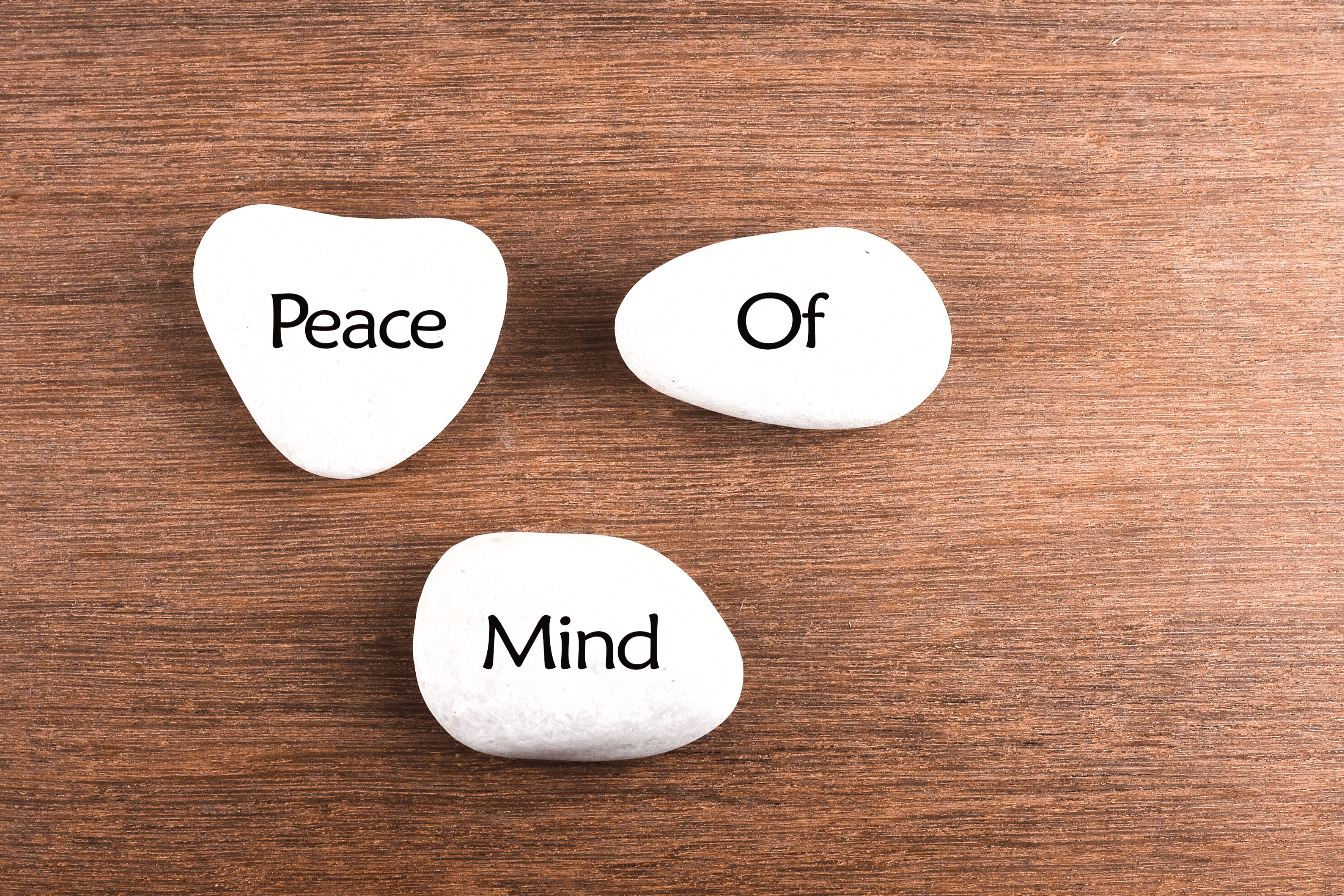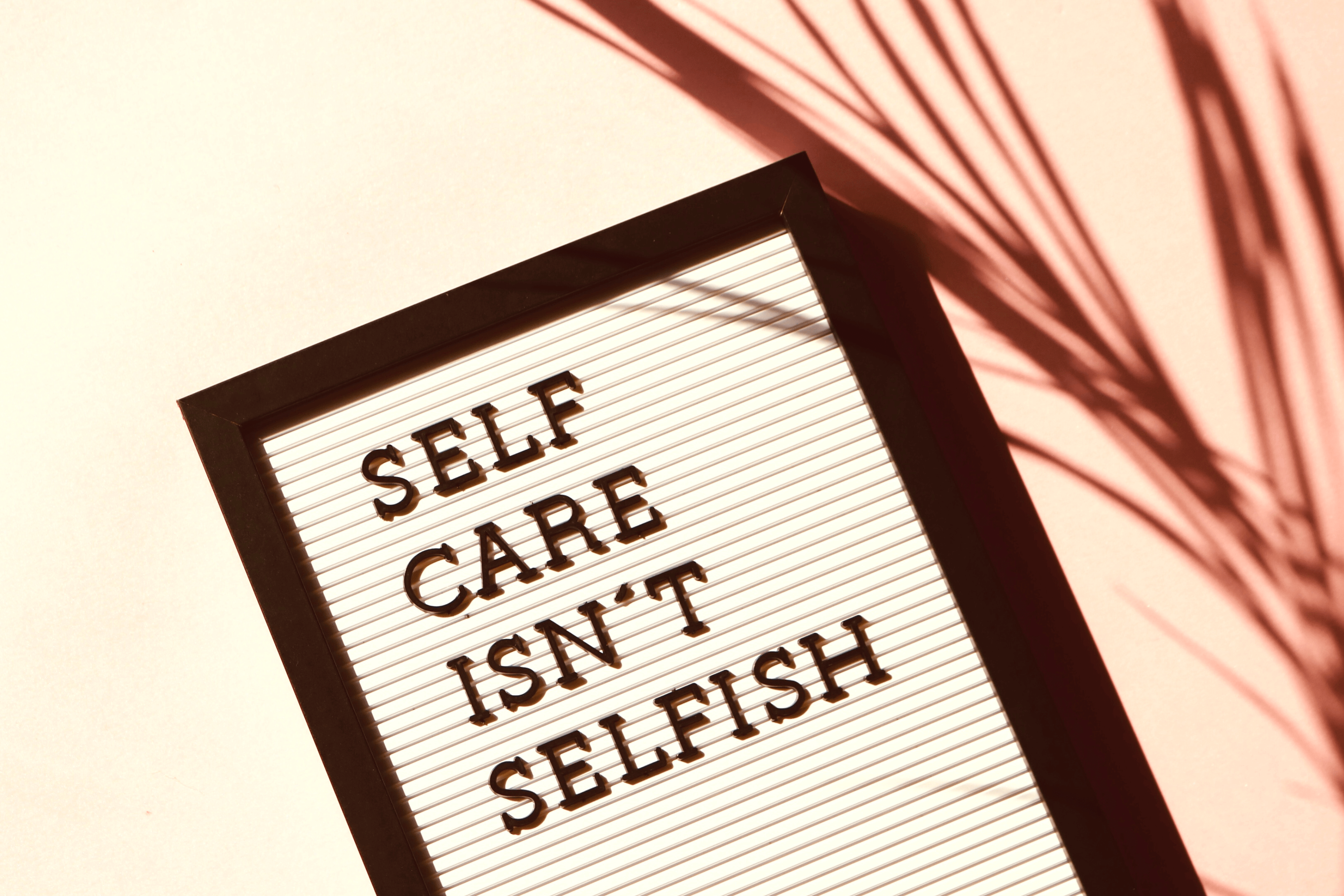
When you read the phrase “Peace of Mind” what do you think about? Going home to double check that you did in fact close the garage door when you left for work? That’s peace of mind. Your child is coughing and has a fever? You take a COVID test and it’s negative. That’s peace of mind.
You replace the gas dryer connection to electric but you start to second guess your skills and call in a professional to make sure you don’t burn your house down the first time you dry your clothes? Yep, that’s also peace of mind. (That one works too. I’m speaking for a friend of course) lol
Miriam Webster online defines Peace of Mind as, “a feeling of being safe or protected”.
We all love that phrase. We all have that ONE friend, maybe two, that we perceive who has peace of mind. They seem so zen, they seem so put together, they “have it going on” (we all know they are not that zen at home, but whatever) Tara Schuster in her book, Buy Yourself the F***ing Lilies (pages 41-43), has a section on how this woman she respected, admired and emulated, Julia seems so “with it all the time” .
She asks Julia, “So Jules, what’s your deal? Why do you never look like you’re going to have a full-blown panic attack? Are you just good at faking looking normal? What is your secret? Her friend Julia left and said sometimes I’m stressed obviously, but to get through it, I usually go for a run “ She goes on about how she began to run and how it “blasted through the anxiety knot in her chest” (page 43)
So how would you define peace of mind?
I think Allstate uses the catchphrase “peace of mind” in their insurance company marketing. They literally say, “your peace of mind is my priority, particularly with the uncertain road ahead.”
They are letting you know that your home and auto are covered if something unplanned happens. It allows you to take a chill and move along without a worry. (okay maybe a few but still, less right?)
So when we see companies marketing their services to help you stay calm, what do we see when it comes to helping US stay calm?
We all want that inner calm, that ability to have self love and compassion. We want to be like Julia who seems unphased in her day to day life events. We want to be ready for anything!

Now That You’ve Defined It for Yourself – Let’s Do This
Psychcentral.com has some great advice for working on your peace of mind and I think you will be surprised at what they say,
“You might assume you can only find peace from within when you’re finally completely free of troubles, but that’s not the case. (I thought the same thing! AND just about this but also about meditation- see my blog about that later).
In fact, it often works the other way around.
Feeling at peace internally can boost overall contentment and feelings of happiness, regardless of the challenges you face. A relaxed and calm outlook can help you navigate life’s often-turbulent waters more smoothly. Finding peace of mind isn’t as challenging as it seems.
You can find peace of mind by:
- accepting what can’t be controlled
- forgiving yourself and others
- staying focused on the here and now
- going within
- journaling your thoughts and emotions
- connecting to Mother Earth
Consider these tips anytime, anywhere, to get started
Accept what you can’t change or control – You can’t actually control your mind and simply tell it, “Be more peaceful” — just as you can’t control life.
Life is unpredictable – From time to time various challenges will surface, complicating your daily routine and leaving you anxious, drained, or even afraid. It’s entirely natural to worry about a parent’s illness, or feel dismayed and angry by your recent job loss. But when you fixate on those feelings, they can eventually take over, disturbing your peace and making it more difficult to cope.
Ignoring those feelings to just get on with things generally doesn’t help, either. Suppressed emotions can intensify, leaving you far less calm down the line. Acceptance, on the other hand, often does make a difference. Research shows that accepting your own thoughts and emotions is an effective strategy.
You can also practice cognitive reframing by reminding yourself:
- “What’s happening right now won’t last forever. In the meantime, I’m doing my best.”
- “This is a tough situation, but I can get through it.”
- “I feel miserable right now, but I won’t always feel like this.”
It’s natural to want to turn away from pain, so it can take time to get in the habit of acceptance. But as it becomes more natural, you’ll likely find yourself feeling more at peace.

What happens with no peace of mind?
The demands of everyday life can lead to stress and other emotional turmoil, no question – especially if you’re going through a rough patch. You typically can’t escape life’s challenges, and inner peace won’t make your difficulties disappear. But mental peace is so important because it can help you remain calm in the face of distress by easing feelings of anxiety, worry and overwhelm.
Without peace of mind, you might eventually begin to notice symptoms of anxiety and stress including:
- sleep disturbances
- aches and pains
- fatigue and low energy
- stomach distress
- anger or irritability
- difficulty concentrating
- relationship tension or conflict
Finding peace from within doesn’t necessarily prevent symptoms of anxiety or depression. All the same, a lack of it could worsen mental and emotional distress.
Practice forgiveness – feeling hurt, even angry, when someone wrongs you or treats you unfairly is an understandable (and completely natural) response. Yet holding on to grudges or slights won’t do much to help you find inner peace. Nursing feelings of anger, disappointment, or resentment takes up plenty of emotional energy and can contribute to physical and mental health symptoms, including:
- poor heart health
- sleep problems
- stomach distress
- depression
- anxiety
Forgiveness doesn’t just benefit the person you forgive. It could do even more for you, in the end. Self-forgiveness is also essential. In fact, according to 2016 research, adults of varying ages who felt more forgiving over the course of 5 weeks experienced less stress and fewer mental health symptoms.
Of course, forgiveness doesn’t always come easily, with a snap of your fingers. It’s often a long and emotionally demanding process that goes beyond simply saying, “I forgive you.” Forgiveness involves compassion and empathy, not to mention acceptance.
That goes for your own actions, too. Going over and over past mistakes won’t erase what happened, but it can leave you mired in self-blame and regret. You’re on the path to self-forgiveness if you’ve already:
- apologized
- made an effort to amend the wrong
- committed to changing your behavior
Your next steps toward a more peaceful mind involve offering yourself compassion and letting go of guilt and shame.
Quieting the Mind is an Ideal Place to Begin – Practice Mindfulness Meditation
Acceptance proving more difficult than you imagined? Sometimes a guiding tool can make it easier to let go of distressing thoughts. Why not give meditation for peace of mind a try? Some of the many potential benefits of this ancient Hindu practice include increased self-awareness, reduced stress, and positive brain changes.
Evidence suggests mindfulness meditation, in particular, can promote greater awareness of the present moment, whether it brings joy or pain. In general, it helps you cope with emotional distress. Mindfulness makes up an important part of Buddhist meditation. Buddhism itself holds inner peace as an essential aspect of well-being.
If you’re familiar with the concept of nirvana, you might know it’s often used casually to describe a state of euphoria or bliss. In Buddhism, though, this ultimate goal does reflect a type of inner calm — the peace that arises in the absence of suffering and desire.
Both focused meditation and increased mindfulness can indirectly help you acknowledge, accept, and let go of the physical and emotional distress that might otherwise stir the waters of your mind. With a regular meditation practice, this acceptance can go a long way toward promoting lasting mental peace.
New to meditation?
- Check out our guide to the best meditation apps.
- Learn more about your options for online meditation.
Peace of Mind is Dedicated Self Care! You Must Make Time for Yourself!
While too much time alone can lead to loneliness, spending just the right amount of time on your own could benefit your well-being and lead to finding peace in a frantic world. Setting aside space for solitude can promote some people’s deeper sense of contentment over time.
Why try solitude? Solitude offers the change to:
- reflect on personal values
- explore your self-identity
- reconnect with your needs
- reevaluate your boundaries
- embrace your creative side
- enjoy your hobbies and favorite pastimes
- start a meditation practice

Any of these activities can boost peace of mind in daily life by helping you recharge, relax, and focus on your personal needs.
Keep a journal – Maybe an English teacher assigned daily journal entries. You completed the exercise grudgingly at first, but with more enthusiasm and commitment once you realized putting your feelings on paper did, in fact, provide you with a different perspective.
Journaling can help you process and express emotions you might otherwise keep inside. Writing, of course, won’t get rid of your troubles. But you might find that committing them to paper helps ease some of their emotional weight and transforms inner peace from an exception to more of a rule.
Get back to nature – Do you head for the trees (or the seas) when you need some rest and respite from the daily grind? An abundance of research backs up your instincts: Natural environments, green spaces in particular, can ease emotional distress and foster feelings of inner calm and peace of mind. Spending time in nature can help you have peace of mind by:
- soothing worry, anger, or fear
- easing stress and promoting relaxation
- lower your risk for depression and other mental health conditions
- enhancing feelings of kindness and social connection
- improving concentration and focus
A few ideas to try:
- Visit a neighborhood park
- Explore a national forest
- Challenge yourself with a hike across rugged terrain (safely, of course!)
- Relax at a nearby beach or lake shore
- Get your hands dirty with a little gardening
Tip: No matter what you choose to do, consider leaving your phone at home (or powered down in your backpack if on a hike). A constant stream of notifications or the urge to refresh your social media feeds can quickly chip away at your newfound calm.
So whether you just love the Allstate campaign or you are actually focused on establishing a new way of managing your peace of mind quotient I hope this blog has served its purpose.
